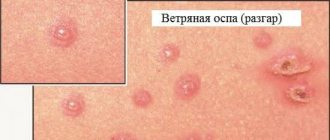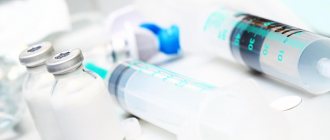According to WHO, among viral infections, the ARVI group of viruses is in first place, and the herpes simplex virus, which can affect the genital area, is in second place. The uniqueness of this virus lies in its ability to invade various organs and systems, causing a wide variety of clinical manifestations and complications. For this reason, the formation of a unified approach to the diagnosis and treatment of patients with herpes is one of the most important tasks of modern healthcare.
- Causes of herpes
- Types
- Manifestations and symptoms in men and women
- Diagnostics
- How to treat during pregnancy
- Is it possible to resort to folk ones?
- Prevention
In total, 8 types of herpes viruses are known: HSV-1, HSV-2, varicella zoster virus, Epstein-Barr virus, cytomegalovirus, HSV-6, HSV-7, HSV-8. The structure of virus particles of different types is practically no different from each other. The virus shell contains antireceptors, thanks to which it can attach to almost any tissue and affect the skin, mucous membranes, central and peripheral nervous systems, liver, blood vessels and blood cells. In addition, in some cases, HSV can lead to malignant transformation of cells.
Genital herpes is caused by herpes simplex virus type 2 (HSV-2), and less commonly by herpes simplex virus type 1 (HSV-1). Previously, it was believed that HSV-1 manifested itself exclusively as rashes on the face, but it has now been established that each of these two types of viruses can also infect the genitals.
Causes of genital herpes
The genital form of the disease has tended to increase in incidence over the past decades. According to one version, in European countries this was facilitated by an increase in the number of sexual partners for the average person, as well as the widespread practice of oral sex. Also, this disease is more common in areas with high population density, in families with a low socio-economic standard of living and in cases of poor personal hygiene.
Read more
Primary infection with the herpes simplex virus in childhood occurs through airborne droplets - as statistics show, among children 6-7 years old, almost half are infected with herpes. Secondary infection most often occurs through genital, oral-genital and anal-genital contact. The virus that causes genital herpes enters the human body through intact mucous membranes or damaged areas of the skin during sexual intercourse. The highest incidence rate is observed among people aged 20-30 years. In many cases, the infected partner is unaware that he is infected, is an asymptomatic carrier of the virus, and transmits the virus to his sexual partners. A number of scientists believe that about 90% of adults are carriers of the herpes virus, but only 10-20% of them experience its clinical manifestations, including rashes on the genitals. This is due to a decrease in immune defense and the presence of other diseases that further weaken the body. It has been established that women suffer from genital herpes more often than men, which is due to their anatomical and physiological characteristics. Also, according to one version, the risk of HSV infection is increased by surgical termination of pregnancy and the use of intrauterine devices.
The virus is also transmitted vertically - from a sick mother to the fetus and through the use of household items together with an infected person. Also, if there are rashes on the lips and nose, there is a possibility of transferring the virus to the genitals. In addition, HSV is often detected in combination with ureaplasma, other STDs and cytomegalovirus.
Consequences
If treatment is insufficient or untimely, the pathology can lead to serious consequences, including:
- persistent changes in the functioning of the immune system, a decrease in the body’s defenses;
- pain in the lower abdomen, which can radiate to the groin area and rectum;
- neurotic pathologies;
- disturbances in the functioning of the peripheral nervous system.
As herpes infection worsens, women experience the following complications:
- vaginal dryness, development of dysbacteriosis;
- the appearance of bleeding cracks through which pathogenic microorganisms easily penetrate;
- secondary infection with viruses and bacteria;
- the appearance of condylomas.
The herpes virus in combination with the human papillomavirus increases the risk of cancer by 7 times! For this reason, it is important to begin treatment for genital herpes from the moment the first symptoms of the disease appear.
Types of genital herpes
Primary genital herpes: symptoms and localization
The first stage of the disease is manifested by the appearance of vesicular elements on the skin and mucous membranes. Initially, swelling, redness, itching and discomfort appear in the area where the virus has been introduced. Sometimes this is accompanied by weakness, lethargy, headaches, enlarged inguinal lymph nodes and increased body temperature. After a few days, rashes appear - small blisters filled with clear liquid, which soon burst open and form weeping erosions. Complete healing of the ulcers occurs in approximately 10-14 days.
The localization of rashes on the genitals is determined by the place where the virus enters the body. In women, clinical manifestations of herpes in the intimate area are observed on the labia majora and minora, in the vagina, in the cervix and perineum. In men, vesicles with transparent contents appear on the head and body of the penis, as well as on the scrotum.
The virus can also infect the urethra, bladder, anus, rectum, ovaries, cervical canal, fallopian tubes, uterus in women and prostate and seminal vesicles in men.
Recurrent genital herpes
50-70% of those infected with HSV experience a recurrent form. It makes itself felt by repeated blistering rashes that periodically appear in the same place. In the mild form, exacerbations occur no more than three times a year, the moderate form is characterized by exacerbations up to six times a year, and in the severe form, the patient suffers from monthly rashes and accompanying symptoms, which can significantly reduce the quality of life.
The arrhythmic course of HSV in the genital area is characterized by the presence of remissions, which can reach several months. According to observations, rare outbreaks of the disease are more intense in clinical manifestations than frequent ones. The monotonous course of the infectious disease most often manifests itself depending on the monthly cycle in women. And with HSV of the subsiding type, there is both a decrease in the intensity of symptoms and an increase in periods of remission.
The causative agent of the disease
Herpes (from the Greek ἕρπης - creeping, spreading skin disease). Genital herpes is a viral infection that affects the penis in men (penile herpes) and the external genitalia and vagina in women (herpes vaginalis, labia), as well as the area around the genitals, usually the perineum. Infection is manifested by the appearance of blisters on the skin. Sometimes they can occur on the buttocks and anus.
The causative agent of the disease is the human herpes virus. There are two types of AI virus: herpes virus type 1 and herpes simplex virus type 2.
- AI virus type 1 most often leads to the appearance of herpes on the lips. Causes half of the cases of genital herpes.
- AI virus type 2 is responsible almost exclusively for the development of genital herpes. Very rarely it can also cause herpes on the lips.
Herpes on the lips
Manifestations and symptoms of herpes in the intimate area in women and men
Herpetic cystitis of women
Herpetic cystitis is a pathology characterized by inflammatory processes in the bladder caused by the herpes virus. This disease manifests itself as discomfort when urinating and hyperemia of the skin and mucous membranes. Women are especially often bothered by the urge to urinate at night. If left untreated, herpetic cystitis can lead to complications, including herpetic salpingoophoritis. In this case, the inflammation affects the ovaries and fallopian tubes.
Herpes of the urethra and bladder
The disease makes itself felt by painful sensations and pain when urinating. There is a frequent urge to go to the toilet, there may be blood in the urine and discomfort in the bladder area. In men, detection of the herpes simplex virus in the urine may indicate inflammation of the prostate gland.
If you suspect herpetic prostatitis, which is characterized by frequent relapses, the patient must undergo a special examination for sexually transmitted infections of a viral nature.
Herpetic lesions of the anal area and rectum
The disease manifests itself with itching, burning and pain in the affected area. Bleeding may occur during bowel movements. As the disease develops, erosions and cracks form on the mucous membrane, which are often attempted to be treated only surgically, without the use of drug antiviral treatment.
Herpes test
You should get tested for herpes if you have typical symptoms.
When diagnosing, the doctor takes into account complaints, medical history and external examination. Identifying typical cases of genital herpes is usually not difficult and is based on clinical manifestations. No special preparation is required to take blood tests for the herpes virus. You can get tested for the herpes virus in Moscow at our clinic. Collection of biological material (separated from the genital tract, saliva, etc.) for a PCR smear for women, children and virgin girls is carried out on any day of the cycle, except for menstruation itself. It is possible to take material for diagnosis from the following places: “U” - urethra “C” - cervix (except virgins) “V” - vagina “R” - rectum “O” - oropharynx
Recommendations for patients on how best to get tested for the herpes virus
It is not recommended to take biomaterial earlier than 24-48 hours after sexual intercourse.
Scraping for PCR analysis of herpes types 1 and 2 from the urogenital tract (in men): it is recommended to take it no earlier than 2 hours after the last urination.
Scraping from the urogenital tract (in women): smears for genital herpes should not be taken: • during menstruation (1, 2, 3, 4 days); • earlier than 5 days after using vaginal suppositories, tampons or spermicides; • after a vaginal examination (pelvic ultrasound, colposcopy), douching.
Diagnostics
What tests for herpes are performed and their cost, ₽
| List of tests | Prices |
| Analysis for herpes types 1 and 2 | 550 |
| Test for herpes type 6 (mouth/nose/throat swab) | 550 |
| Blood test for herpes | |
| PCR blood for herpes type 1 and 2 | 750 |
| Antibodies to herpes type 1 IgG | 850 |
| Antibodies to herpes type 2 IgG | 850 |
| Antibodies 1 and 2 IgG | 950 |
| Antibodies 1 and 2 types IgM | 850 |
| Antibodies type 1 and 2 IgG (avidity) | 950 |
| Test for herpes type 6 IgG | 850 |
| Herpes virus type 6 (colic) | 750 |
Treatment of genital herpes during pregnancy
The greatest danger of this disease is that the virus can infect the nervous tissue of the fetus, which can lead to the development of intrauterine pathologies. It is especially dangerous if the disease develops in early pregnancy. It can interfere with the normal development of fetal organs and tissues and even lead to spontaneous miscarriage and premature birth. Herpes viruses occupy second place after the rubella virus in terms of teratogenicity - disruption of the process of embryogenesis, leading to developmental abnormalities. More than 60% of children infected with herpes develop encephalitis.
To prevent infection of the fetus as it passes through the birth canal, the expectant mother is most often recommended to have a cesarean section.
How to treat herpes
Treatment for genital herpes has the following goals:
- preventing the development of infection;
- shortening the clinical course of the disease and reducing the incidence of complications of primary infection (such as aseptic meningitis and urinary retention);
- relapse prevention;
- preventing disease transmission.
Treatment of herpes infection is a complex task and is carried out in two directions: the use of antiviral chemotherapy drugs and the use of drugs that enhance immunity.
In our opinion, a promising direction in solving the issue of treatment and prevention of herpes infection is the use of photodynamic therapy. It reduces the number of clinical manifestations of the virus and creates certain conditions in a person’s immune status to prevent relapse of the disease.
Treatment of herpes in the intimate area with folk remedies: will traditional medicine help?
Traditional medicine existed in all periods of human history, and the experience of traditional healers multiplied over the millennia and was passed on from generation to generation. True, one cannot help but admit that today many of the recipes that our ancestors used have been lost and forgotten, and the assessment of traditional medicine by specialists is still ambiguous. What happens when treated with traditional medicine methods
Today, traditional medicine offers both rational methods, which, under certain conditions, can really help cope with various diseases, and irrational ones, which deserve critical evaluation by doctors. But this does not stop those who, instead of turning to a specialist, decided to help themselves on their own by testing the effectiveness of traditional medicine recipes. As a rule, such people will be disappointed - no decoctions, infusions, applications of medicinal herbs and other drugs prepared at home can help get rid of the manifestations of herpes in the intimate area. It must be remembered that refusal to see a doctor and lack of adequate treatment can lead to unpredictable consequences and the development of life-threatening complications.
Only antiviral drugs that not only relieve symptoms, but also fight the root cause of the disease can help reduce the severity and shorten the course of the disease.
Treatment
In mild cases, where there are few blisters and the victim is otherwise healthy, treatment may consist of antiviral creams. Tablets are also available to help prevent or reduce the symptoms of a blistering outbreak.
Severe or complicated cases require antiviral drugs intravenously, that is, through a drip. Pregnant women with genital herpes should be checked regularly; Babies born vaginally can get the herpes virus from their mother, and this can put the baby at risk for serious complications.
Antiviral drug VIFERON for genital herpes
To combat herpes in the intimate area, it is recommended to use antiviral agents containing interferon. According to experts, interferon has a powerful antiviral effect, and its deficiency is one of the main causes of relapse of the disease. One of the drugs used to treat herpes is VIFERON - an antiviral and immunomodulatory drug with an indirect antibacterial effect, which has a number of unique pharmacological properties.
The drug contains interferon alpha-2b, which blocks the reproduction of viruses and also corrects the body’s own immunity. VIFERON is available in the form of suppositories, ointments and gels. To treat herpesvirus infections in children, suppositories are used in a dosage of 150,000 IU once every twelve hours, for adults - 1,000,000 IU, for pregnant women - 500,000 IU. Gel and ointment are also used to combat herpes in the intimate area. The gel has a hydrophobic base and is better absorbed on the skin, and the ointment has a hydrophilic base and is better absorbed on mucous membranes. The gel in the form of a strip no more than 0.5 cm is applied to the previously dried affected surface 3-5 times a day for 5-6 days. The ointment is applied to the affected surface 3-4 times a day for 5-7 days.
The drug VIFERON Suppositories (suppositories) suppresses the activity of viruses and increases the effectiveness of the body’s own immune response to pathogenic microorganisms. And VIFERON Gel and VIFERON Ointment, when applied to the skin and mucous membranes, form a thin protective layer, which allows you to fight viruses and also strengthens local immunity.
Symptoms and signs
Human herpes simplex virus types 1 and 2 can equally cause primary and secondary infections. Typically, the course of the disease depends on the state of the person’s immune system and the genetic characteristics of the virus. Primary infection with HSV-1 and HSV-2 is characterized by general symptoms and a high percentage of complications, while recurrent herpes, on the contrary, has less pronounced symptoms and periodic remissions. Frequent exacerbations of the process are usually characteristic of patients with immunodeficiencies. HSV-1 is milder than HSV-2.
Prevention of genital herpes virus infection
To prevent infection, you must remember to use a condom during casual sexual intercourse, as well as the use of antiseptics to treat areas of the skin where the virus can get. Relapses of the disease are observed with a decrease in immune defense, various diseases, stress, and even with frequent overheating and hypothermia. Therefore, in order for the clinical signs of herpes to make themselves felt as rarely as possible or not to appear at all, you must try to lead a healthy lifestyle, eat well and get enough rest, as well as regularly take vitamin supplements recommended by your doctor.
To prevent self-infection, in order to prevent the virus from being transferred from the face in the presence of rashes on the lips to the genital area, it is necessary to adhere to the rules of personal hygiene and wash your hands more often. Each family member should have separate towels for different parts of the body.
After unprotected sexual intercourse, during sexual relations with a carrier of the herpes simplex virus, and when planning pregnancy, it is necessary to undergo regular examinations with a doctor.
Reference and information material
Author of the article
Belyaev Dmitry Alexandrovich
General doctor
Loading...
Take other surveys
Diagnostics
Diagnosis is mainly based on the clinical picture. But in uncertain cases, they turn to laboratory tests.
Materials are taken from those infected with genital herpes for various tests:
- determination of virus culture;
- polymerase chain reaction to determine the genetic material of the virus;
- carry out tests using antibodies to the genital herpes virus to confirm the presence of the disease.
The doctor or laboratory worker takes a sample from the rash, sometimes the patient's blood, to confirm the immune response to the presence of genital herpes. To identify antibodies, a test product is taken from the rash, mucus, urine, tear fluid, and rarely, cerebrospinal fluid are also collected.










